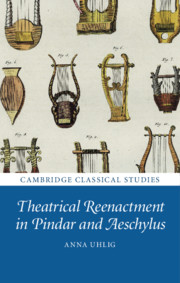Book contents
- Theatrical Reenactment in Pindar and Aeschylus
- Cambridge Classical Studies
- Theatrical Reenactment in Pindar and Aeschylus
- Copyright page
- Contents
- Acknowledgments
- Introduction
- Chapter 1 Voices of Others Embedded Speech in Pindar and Aeschylus
- Chapter 2 Anachronistic Harmonies Agamemnon parodos, Pythian 4
- Chapter 3 Vocal Tools Pythian 12, Olympian 13, Seven Against Thebes
- Chapter 4 Somatic Semblances Choephoroi, Olympian 8, Pythian 2
- Chapter 5 Locating the Revenant Pythian 8, Persians
- Conclusion
- References
- Index
Chapter 5 - Locating the Revenant Pythian 8, Persians
Published online by Cambridge University Press: 07 July 2019
- Theatrical Reenactment in Pindar and Aeschylus
- Cambridge Classical Studies
- Theatrical Reenactment in Pindar and Aeschylus
- Copyright page
- Contents
- Acknowledgments
- Introduction
- Chapter 1 Voices of Others Embedded Speech in Pindar and Aeschylus
- Chapter 2 Anachronistic Harmonies Agamemnon parodos, Pythian 4
- Chapter 3 Vocal Tools Pythian 12, Olympian 13, Seven Against Thebes
- Chapter 4 Somatic Semblances Choephoroi, Olympian 8, Pythian 2
- Chapter 5 Locating the Revenant Pythian 8, Persians
- Conclusion
- References
- Index
Summary
This chapter explores how, despite their common interest in reenactment, Pindar and Aeschylus treat space in different ways. Drawing on recent theoretical advances in performance studies, it is shown how the appearance of ghosts in the works of Pindar and Aeschylus allows us to better appreciate how drama creates a firmer spatial matrix than lyric performance.
- Type
- Chapter
- Information
- Theatrical Reenactment in Pindar and Aeschylus , pp. 219 - 266Publisher: Cambridge University PressPrint publication year: 2019

